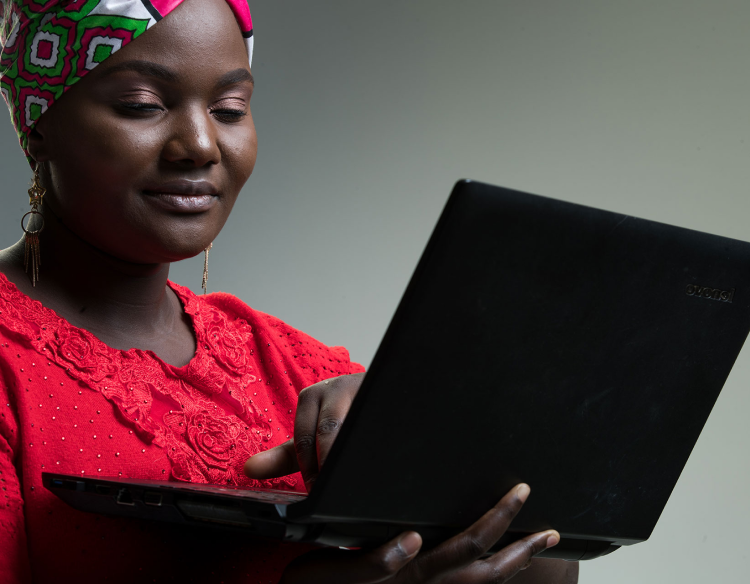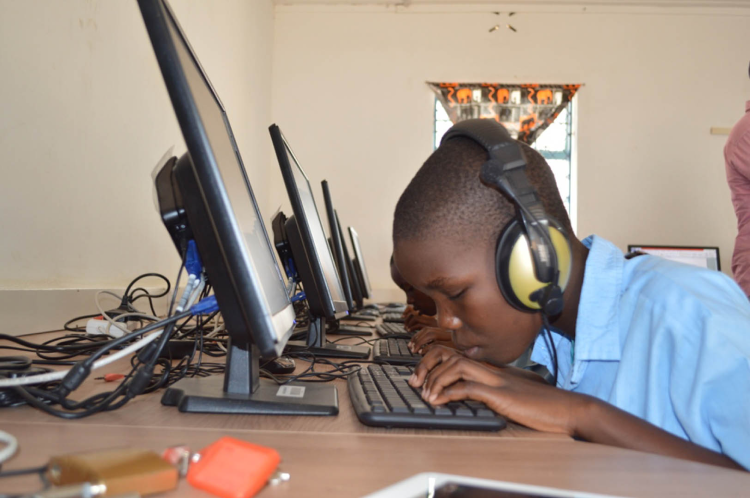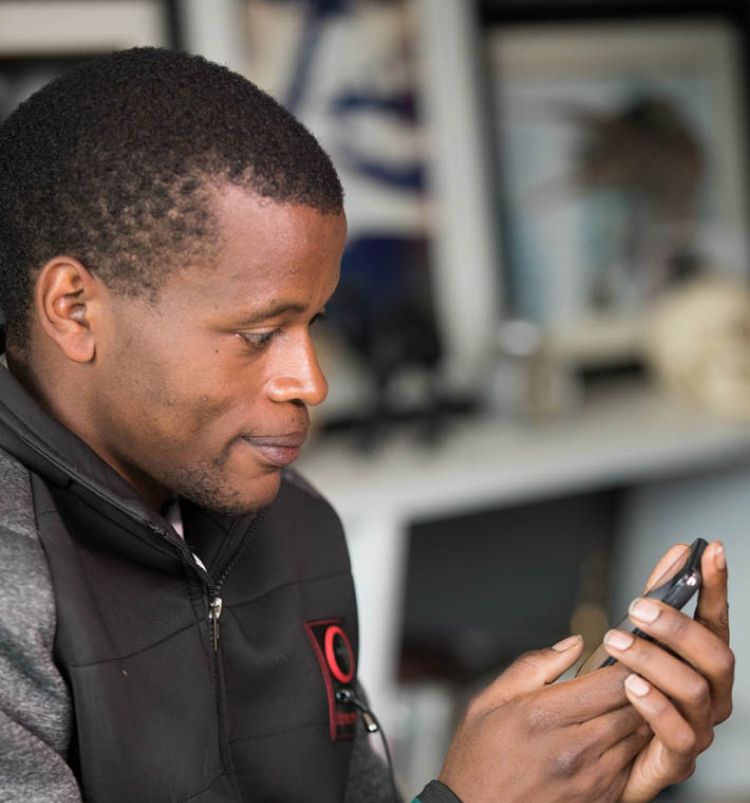Assistive Technology Labs
Assistive Technologies and Beyond
inABLE empowers youth who are blind, have low vision, and are sometimes multi-disabled. Because of their visual disability, they learn to read using Braille, and computer assistive technology provides voice-to-text. Today, inABLE’s programs have diversified and are intended to have a lasting and transformative impact on the lives of beneficiaries.

Bridging the gap between the blind and sighted in Kenya through computer assistive technology and digital accessibility. As a result, our graduates can pursue advanced education and seek gainful employment in fields that would otherwise be out of reach. For example, inABLE Computer-Labs-for-the-Blind graduate Anthony Wambua has gone against all odds to become the first blind Kenyan computer programmer.
Contributing to increased feelings of self-worth, self-esteem, and independence for our graduates. In 2015, inABLE took part in a nationwide survey of blind and low-vision students at schools across Kenya as part of the Mwangaza Project, an international collaboration to improve education for Kenyan learners with vision loss. During the study, it was observed that students in the inABLE program had a positive outlook about themselves and life as a whole, with higher self-confidence than students in schools that did not have an inABLE computer assistive technology lab. Specifically, these students did not view themselves as a burden to society; they showed high interest and confidence in learning computer skills.
According to World Bank, there are approximately one billion people, or 15% of the world’s population, living with some form of disability, and 80 million in Africa (African Studies Centre - UN). Eighty per cent of Persons with Disabilities (PWDs) live in developing countries, according to the UN Development Program (UNDP).
Assistive Technologies Labs
inABLE partners with schools for the blind in Kenya to implement its computer programs. In Kenya, since 2009, inABLE has established eight assistive computer technology labs in six special schools for the blind.
Our technology program is effective because inABLE provides everything required, including setting up assistive technology labs and providing basic skills training that is critical for students to operate the devices and take advantage of online content independently.
inABLE installs the infrastructure, computer furniture, hardware, software, and accessories in each of the assistive technology labs, which are now in several Schools for the blind in Kiambu, Siaya, Meru, and Mombasa counties.

Some of the schools that we partner with include:
- Thika Primary School for the Blind
- Thika High School for the Blind
- St. Lucy’s Primary School for the Blind
- St. Lucy’s High School for the Blind
- St. Oda Primary School for the Blind
- Likoni Primary School for the Blind
- Likoni High School for the Blind
Assistive Technology Skills Training
inABLE’S team of Assistive Technologies trainers understand the potential barriers in education and everyday life for the blind and low-vision youth. The Assistive Technology training thus enables the blind and low-vision youths to fulfill their potential by equipping them with the following skills.
Basic Computer Skills
Blind students have mastered the keyboard and advanced to skill-building computer modules, such as typing, sending emails, Microsoft Word, and utilizing apps such as Kindle. Thanks to these assistive-technology computer labs, eligible students are now able to...
Read More on Computer SkillsEmployable Skills Training
To equip blind and visually impaired students with valued workplace aptitudes upon graduation, inABLE offers employable skills training such as:
- Web Design –advanced students have an opportunity to learn how to create a website with HTML coding.
Increased Proficiency with iPads, Desktop, and Laptop Computers
inAble students learn how to operate multiple computer devices and help identify the most accessible hardware and software. Many of the blind students in the inABLE Computer Labs for the Blind program can now use iPads (by touch) and desktop and laptop computers.
Read More on thisPeer-to-Peer Training
Several advanced level computer students are now capably training fellow students. Peer-to-peer instruction has proven to be a very effective resource, particularly for those students who need extra support.
Read More on this
AdvocABLE: Advocacy, Mentorship, and Coaching
Advocacy
AdvocABLE is an inABLE program that began in 2021. It tackles issues of advocacy and mentorship, providing a personalized coaching experience and a go-to haven for youth living with a disability. It offers a break from the psychosocial and economic challenges they face in their day-to-day life and school. AdvocABLE is a long-term project that targets the youth in primary and high schools for the blind and visually impaired that runs the inABLE computer program from the upper primary level and above. The mentored advocacy is achieved through direct contact with students and focuses on their respective areas of study and plans.


Mentorship & Coaching
In 2022, the US Embassy in Kenya partnered with inABLE to initiate an 8-month Creating Tomorrow’s Business Leaders project to equip blind youth with computer and soft skills to develop entrepreneurial skills and the specific mitigation competencies that blind people use to participate in the workforce. This project includes 60 blind youth (40 girls and 20 boys) in Kenya aged 15-30 from four counties (Siaya, Thika, Meru & Mombasa) who are presently enrolled in the inABLE Computer-Labs-for-the-Blind program.
In addition to the above training, the French Embassy in Nairobi funded a 2022 project that engages girls through training in the inABLE assistive technology computer labs across Kenya to empower young girls—between the ages of 15 and 30 years — in ICT and entrepreneurial skills.
Homeschooling
As was the case globally, the inABLE partner schools were closed in response to the COVID-19 pandemic. This unanticipated interruption shed light on numerous issues affecting our students' access to education and broader socio-economic matters.
When UNESCO recommended the use of distance learning programs, inABLE quickly set up a pilot distance-learning project with open educational applications and platforms that blind and low vision students and teachers use remotely to learn and resume education.
This pilot homeschool project has reached 50 students of the 1,550 students in the Computer-Lab-for-the-Blind program, majorly due to the cost implication of procuring 1,550 laptops for home use for the entire student population within such short notice. We are actively fundraising to expand this remote learning program to all students.
The distance learning project activities involve:
- the teachers, staff, students, and caregivers on the accessibility features of the new devices (laptops).
- Creation of accessible learning content by the instructors..
- The students are expected to cooperate with instructors and teachers to ensure that they read the contents sent to them, carry out the assignment and send it back to the teachers for marking.
